
Supreme Court Halts Government’s Fact-Checking Unit Amid Free Speech Concerns
Last Updated on March 22, 2024 by News Desk
The Supreme Court in India has stayed the notification issued by the Central government forming Fact Check Units (FCUs) under the 2023 Information Technology (Intermediary Guidelines and Digital Media Ethics Code) Amendment Rules (IT Amendment Rules 2023).
The IT Amendment Rules, 2023 provide that the Central government’s Ministry of Electronics and Information Technology can notify a fact-checking body, which is empowered to identify and tag what it considers false or fake online news with respect to any activity of the Central government.
The FCU of the Press Information Bureau, under the helm of the Union Information and Broadcasting Ministry, was notified yesterday. A bench of Chief Justice of India (CJI) DY Chandrachud with Justices JB Pardiwala and Manoj Misra took the view that the challenge to the validity of IT Rules involves serious constitutional questions and its impact on free speech and expression would need to be analysed by the Bombay High Court. The court proceeded to stay the notification setting up FCU.
The Bombay High Court had rejected the plea for stay prompting them to move the apex court. Senior Advocate Darius Khambata, appearing for stand-up comedian Kunal Kamra, stated that despite safe harbor provisions under Section 79 of the Information Technology Act protecting intermediaries, they might simply take down the content flagged by the FCU instead of taking any risk. He questioned why the rules focused on protecting the Central government and why the rules assume that fake news is binary – true or false with no place for a marketplace of ideas.
Advocate Shadan Farasat, appearing for the Editors Guild of India, argued that the government dictating whether or not something was true struck at the core of Article 19(1)(a) (right to freedom of speech and expression) of the Indian Constitution. He underlined that the model code of conduct (MCC) was in place and argued that it was the worst time for the FCU to be notified given that potentially, the government’s version will become the only version of truth.
Solicitor General Tushar Mehta underlined that the medium being dealt with was uncontrollable and spanned across borders. He stated that with the new regulations, intermediaries are not required to take violative content down but are required to display a disclaimer that FCU says that the content is fake. If Facebook thinks that a post on its platform is not fake and refuses to add the disclaimer, an aggrieved person can approach a court and Facebook would not be able to plead that they are protected by safe harbor.
The CJI asked whether it would be the intermediary’s burden to prove the truth. SG Mehta replied in the affirmative and clarified that it would be restricted only to government business. The final hearing on the challenge to the IT Amendment Rules itself would commence before the Bombay High Court on April 15.




